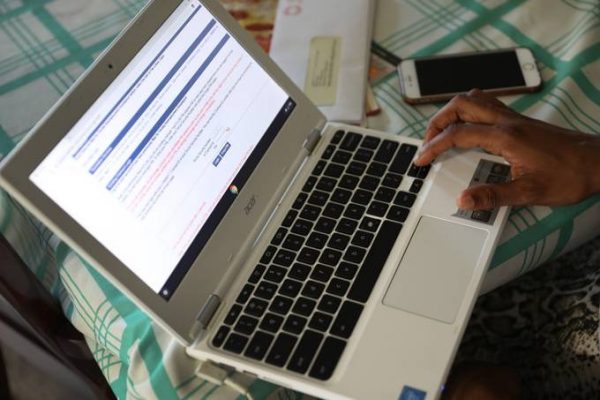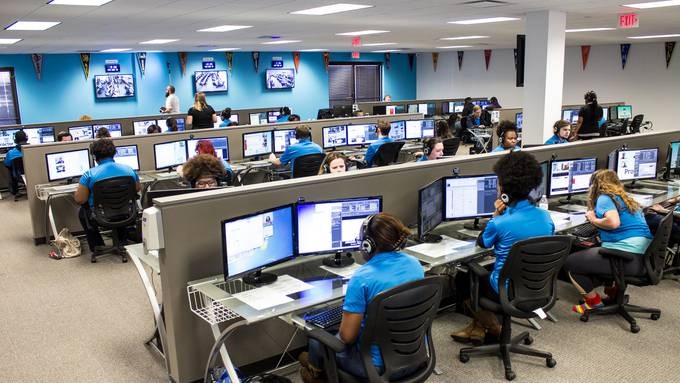Analysis | The Technology 202: State unemployment websites are crashing amid record number of claims – The Washington Post
With Tonya Riley

A woman uses her computer to fill out the application for unemployment benefits after being laid off. Photo by Joe Raedle/Getty Images)
Ctrl + N
State unemployment websites across the country are crashing as fired Americans rush to seek benefits amid the economic fallout of the coronavirus.
A record 6.6 million workers applied for unemployment last week — underscoring the massive amount of pressure being thrust onto an already overwhelmed system.
Local media reports from New York, Pennsylvania, Michigan and Florida highlight how the states’ online systems were woefully unprepared to handle the flood of jobless claims – and the kind of drastic and sudden economic downturn the country is experiencing.
The technical problems could delay people across the country in accessing unemployment benefits.
“I’m not at all surprised that some of the antiquated systems are having trouble with all of the traffic,” Michele Evermore, a policy analyst at the National Employment Law Project, tells me. Evermore said many states still rely on decades-old mainframe computer systems to process unemployment claims, and the systems vary dramatically from state to state.
“There are states that knew their systems were not in good shape,” she added. “Every state is working to modernize their IT, but it’s cumbersome and it’s a long process.”
New York, the epicenter of the coronavirus pandemic in the U.S., is under exceptional strain. In the five days from March 23 to March 28, the New York Department of Labor received 3.4 million hits on its site for online unemployment filing, according to an NBC News report. Compared to 350,000 in a typical week, that represents nearly a 900 percent increase in Web traffic. In that same period, the department fielded more than 8.2 million calls — a massive increase from its average of 50,000 calls per week.
New York Gov. Andrew M. Cuomo, seeking to reassure residents, said that tech companies were working on the problems, and the department increased server capacity.
The tech problems are “compounding people’s stress,” he said. “You’re unemployed, you’re trying to get on some darn website, you can’t get through the website. We have companies working on it. We have literally hundreds of people working on it. I apologize for the pain — it must be infuriating to deal with.”
Florida Gov. Ron DeSantis (R) is particularly under fire for not moving decisively enough to fix the state’s system last year. The Tampa Bay Times reports that state auditors warned him in 2019 that Florida’s unemployment website was suffering major problems, including glitches and error messages. State officials reportedly made no serious attempts to fix the issues — even though auditors had warned about them in previous audits going back to 2015.
“This is absolutely shocking,” state Rep. Anna Eskamani, D-Orlando, told The Tampa Bay Times. “The Republican Party of Florida and Republican leadership who crafted this website deserve all the shame right now and should be held responsible for fixing it immediately.”
Now states are taking extreme measures to reduce the surge. In New York and Michigan, state officials are asking residents to reduce traffic by only filing unemployment insurance claims on certain days, based on the first letter of their last name.
The pressure on the unemployment websites underscores how tech glitches could derail many of the efforts to get relief quickly into the hands of Americans. My colleague Tony Romm reported yesterday that there’s a scramble to create a new online system to send coronavirus stimulus checks.
“The technology is undermining the stimulus program,” Nina E. Olson, the executive director of the Center for Taxpayer Rights, who previously served at the Internal Revenue Service as the U.S. taxpayer advocate, told Tony.
BITS, NIBBLES AND BYTES
BITS: Local unemployment officials in California, Illinois, Washington and a slew of other states are signaling that they aren’t yet ready to start processing unemployment aid for gig economy workers, my colleague Tony Romm reports. Many states say they need more time to set up a new system that can process additional benefits — and some say they may not be able to accept applications until later this month.
That could jeopardize the lifeline that many Uber drivers, Airbnb hosts and Postmates couriers are expecting from the $2 trillion coronavirus rescue package.
Until now, many of these workers were ineligible for traditional unemployment benefits because they were independent contractors, not employees. Congress sought to temporarily fix that in the stimulus bill, but has become increasingly clear to some in the industry that delays in disbursing aid could make it hard for them to pay bills or make rent.
California state officials don’t appear ready to handle applications, Veena Dubal, an associate professor at the University of California, Hastings College of the Law, who is an advocate for gig workers and labor rights, told Tony.
“There is a lot of confusion about how the states are going to be rolling out the benefits provided in the CARES Act,” she said.
NIBBLES: Third-party Amazon sellers are promising protection against the coronavirus in product images — effectively circumventing Amazon’s algorithms that are cracking down on coronavirus profiteering in text describing their listings, my colleague Jay Greene reports. The listings show how Amazon struggles to police its marketplace during the global health crisis.
One seller advertising “Lutos Advanced Hand Sanitizer” said in gallery images that it would “protect you from COVID-19,” but did not make the same claims in the product description. Amazon warned sellers in February it would remove items making misleading coronavirus claims, but its automated algorithms to detect seller violations don’t scan text in images.
Amazon removed that product and similar listings that Jay inquired about.
“When we find a bad actor, we close their account, any related accounts they may be using, and constantly monitor new accounts to ensure they are not related to a previously detected bad actor,” Amazon spokeswoman Cecilia Fan said in an emailed statement. Amazon has blocked or removed more than 6.5 million products, she said.
The listings highlight how the company’s reliance on third-party sellers opens it up to a host of content moderation challenges.
“The coronavirus has resurfaced a bunch of issues we’ve seen about Amazon in the last several years,” Juozas Kaziukėnas, chief executive of the e-commerce research firm Marketplace Pulse, told Jay. (Amazon founder and CEO Jeff Bezos owns The Washington Post.)

Proctors in ProctorU’s Hoover, Ala., office watch over students. (ProctorU)
BYTES: Privacy advocates say a rush by colleges to hire “digital proctors” to monitor students during exams forced online by the coronavirus robs students of their privacy and could open the floodgates for mass surveillance, my colleague Drew Harwell reports.
“Students are paying tens of thousands of dollars to have their higher-ed institutions sell them out,” Bill Fitzgerald, a researcher at the nonprofit group Consumer Reports, told Drew.
Drew found that many of the companies retain the rights to reams of personal data including students’ home addresses, citizenship status, medical records and biometric data, including fingerprints, facial images, voice recordings and “iris or retina scans.”
The cottage industry of companies all offer a similar product: having a mix of human proctors and technology monitor a student via webcam while they take an exam. The technology is meant to detect signs of cheating, such as looking away from the screen too long.
But some students have said they’ve been falsely flagged for innocuous behavior, such as looking away from the screen to solve a math problem on paper. One student even asked for permission to throw up at her desk during her exam — going right back to work when she was finished and only cleaning herself up when the two-hour test concluded.
And not all professors are on board. “Students are asked to agree to these decisions, but they have no meaningful power not to consent,” said Guy McHendry, an associate professor at Creighton University, which uses the software. “And because we’re doing this with such urgency, we don’t really have time to ingest all the implications of what these companies will do.”
PRIVATE CLOUD
– At least 50 start-ups have laid off or furloughed about 6,000 employees during the coronavirus pandemic, Erin Griffith at the New York Times reports. The fallout is hitting small and large start-ups alike, even throwing the fate of prospects of public offerings from companies such as Airbnb into chaos.
“Start-ups have always been risky, designed to grow fast or die, but the coronavirus pandemic is turbocharging Silicon Valley’s natural selection and causing a shake-up so sudden it has defied comparison,” Erin writes.
Hiring has also moved to a halt. Job listings at the 30 most valuable start-ups dropped 19 percent last month, a research company Thinknum Alternative Data. Funding also declined, and many venture-backed start-ups are concerned that they aren’t eligible for small-business aid under the coronavirus stimulus package.
— Facebook and Fox News will co-host a town hall today featuring “medical and business experts” including two members of the White House coronavirus task force. Participants will engage in the town hall via Facebook’s Portal calling device. The two companies will also send a joint donation of $1 million to Feeding America’s covid-19 response fund.
— News from the private sector:
Elon Musk’s SpaceX bans Zoom over privacy concerns: memo
Elon Musk’s rocket company SpaceX has banned its employees from using video conferencing app Zoom, citing “significant privacy and security concerns,” according to a memo seen by Reuters, days after U.S. law enforcement warned users about the security of the popular app.
Reuters
YouTube is developing a rival to TikTok
YouTube is working on a video feature called Shorts that will go head to head with the popular TikTok app.
NBC News
T-Mobile Absorbs Sprint After Two-Year Battle
The conclusion of the cellphone carriers’ combination brings to an end years of wrangling with federal and state authorities.
Wall Street Journal
PUBLIC CLOUD
— News from the public sector:
NY lawmakers, unions urge Jeff Bezos to close Amazon warehouses hit by coronavirus
The group also called for the “swift reinstatement” of a Staten Island warehouse worker who was fired after organizing a protest.
CNBC
Elizabeth Warren Calls on Uber, Instacart to Reclassify Workers as Employees
“You have a responsibility to protect their health and the public’s health.”
Vice
FTC sues to unwind Altria’s $12.8 billion investment in Juul
The two companies worked together to eliminate competition
The Verge
#TRENDING
— News trending around the Internet:
Internet Culture
The Internet is (mostly) taking this April Fools’ Day off
Normally, April Fools’ Day is a marketing bonanza. Amid covid-19, it’s eerily silent.
Travis Andrews
The internet wants you to believe you aren’t doing enough with all that “extra time” you have now. But staying inside and attending to basic needs is plenty.
The New York Times
CHECK-INS
- Protocol will host a virtual conversation with Rep. Ro Khanna (D-Calif.) today at 3 p.m. ET.














